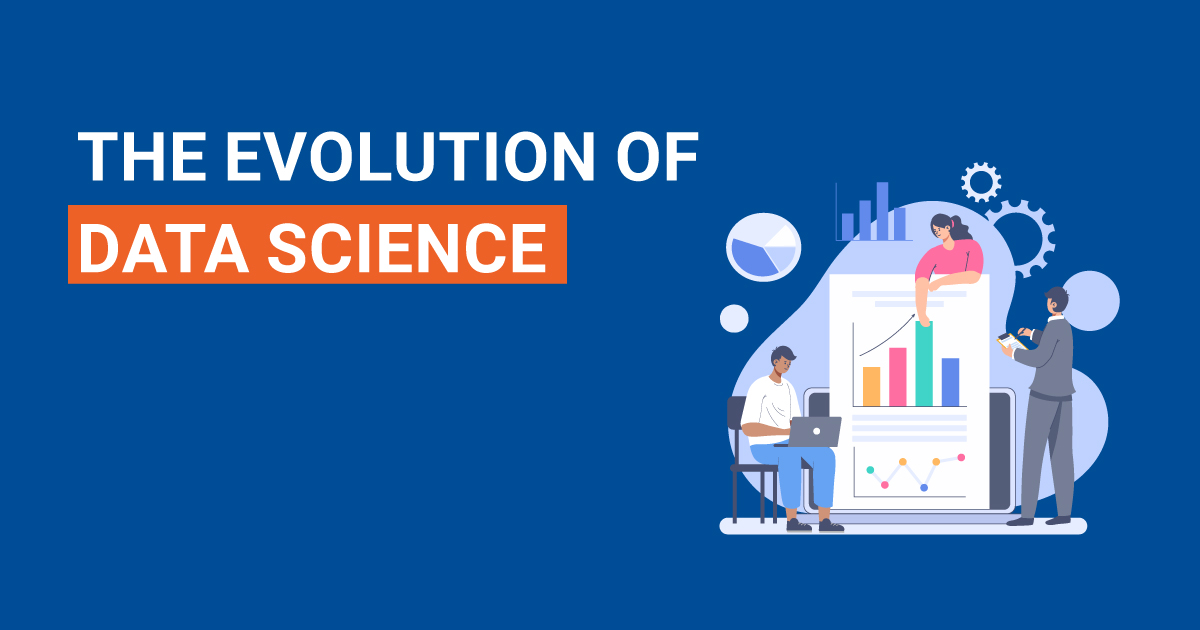Introduction
Data science has changed the way businesses operate in today’s data-driven world. With the explosion of data generated from various sources. The organizations are rapidly adopting data-driven decision-making processes. As we look toward the future, it’s essential to understand the trends. That will shape the landscape of data science over the next decade. This blog will explore various aspects of data science. From technological advancements and shifting workforce dynamics to ethical considerations and emerging applications.
The Evolution of Data Science
Before delving into evolution in data science in future trends. It is essential to understand how data science has evolved over the past decade. Initially, data science was primarily focused on basic analytics and statistical analysis. With the advent of big data technologies and machine learning, the discipline has expanded considerably. Now encompassing various techniques and methodologies. Including predictive modeling, natural language processing, artificial intelligence (AI), and more.
Key Milestones in Data Science Evolution
- The Rise of Big Data: With the proliferation of IoT devices, social media, and online transactions, vast amounts of data are being generated every second. Big data frameworks like Hadoop and Spark came into play to handle these massive datasets.
- Advancements in Machine Learning: Machine learning algorithms have become more sophisticated and accessible. In the leading to their widespread adoption across industries. Tools like TensorFlow and PyTorch have democratized AI development, enabling even small businesses to leverage these technologies.
- Cloud Computing: The shift to cloud computing has transformed how organizations store and process data. Solutions like AWS, Azure, and Google Cloud provide scalable resources. For data storage and analytics, making data science more cost-effective.
- Data Democratization: Data science is no longer the sole domain of specialists. Self-service analytics tools have emerged, allowing non-technical users to access and analyze data.
- Ethics and Accountability: With an increase in data usage comes a greater responsibility to handle data ethically. Discussions around data privacy, algorithmic bias, and responsible AI have gained traction.
Trends Shaping the Evolution in Data Science
1. Automation and Augmented Analytics
As data science continues to evolve, automation will become a prominent trend. Automation will simplify repetitive tasks. Such as data cleaning and preparation, allowing data scientists to focus on more complex analyses. Augmented analytics, which combines AI and machine learning algorithms with traditional analytics. It will enable users to gain insights from data more rapidly.
Implications:
Organizations adopting automated analytics tools will see increased efficiency and reduced time to insights. The role of data scientists may shift toward interpreting results. And making strategic decisions rather than performing routine data processing tasks.
2. The Rise of No-Code/Low-Code Platforms
No-code and low-code platforms have gained popularity by enabling users to build applications. And analyze data without requiring extensive programming knowledge. These platforms democratize access to data science tools. Empowering more individuals to engage with data and analytics.
Implications:
As no-code and low-code platforms improve, organizations can expect a broader workforce capable of analyzing data. This trend will foster a data-driven culture across departments. And levels, reducing the dependency on specialized data science teams.
3. Enhanced AI and Machine Learning Techniques
Over the next decade, we can expect significant advancements in AI and machine learning algorithms. Techniques such as deep learning, reinforcement learning, and transfer learning. Will become more refined and applicable to diverse domains.
Implications:
These advancements will lead to more accurate predictions and insights, enhancing the quality of decision-making across industries. Businesses will increasingly rely on sophisticated AI systems. To drive operations, resulting in greater innovation and efficiency.
4. Growing Importance of Ethics and Responsible AI
As data science becomes more integrated into everyday life, ethical considerations will take center stage. Issues like data privacy, algorithmic bias, and transparency will be critical as organizations strive to build trust with consumers.
Implications:
Companies will need to establish ethical guidelines. Thi is for data usage and AI implementation, fostering accountability in their operations. An emphasis on responsible AI practices will likely involve collaboration between data scientists, ethicists, and legal experts.
5. Increased Focus on Data Governance
With the growing amount of data and associated risks, organizations will place greater importance on data governance. This includes establishing frameworks for data quality, security, compliance, and access management.
Implications:
Robust data governance policies will be vital for mitigating risks and ensuring data integrity. Organizations will need to invest in tools. And practices that support effective data governance and enable seamless data sharing while maintaining privacy.
6. Integration of Data Science with IoT
The Internet of Things (IoT) will continue to generate massive datasets in areas. Like smart homes, healthcare, and industrial applications. Integrating data science with IoT will enable organizations to analyze real-time data and derive valuable insights.
Implications:
Data scientists will play a critical role in developing models that can process and analyze streaming data from IoT devices. This real-time analytics will enhance operational efficiency, predictive maintenance, and customer experiences.
7. Emphasis on Data Literacy
As data becomes increasingly central to decision-making, the need for data literacy will rise. Organizations will focus on upskilling employees to understand data concepts, tools, and interpretations.
Implications:
Businesses will invest in training programs to ensure all employees can engage with data effectively. This emphasis on data literacy will lead to more informed decision-making at all organizational levels.
8. Edge Computing
Edge computing, which involves processing data near the source of data generation. Rather than relying solely on centralized cloud servers, it will gain traction. This approach is particularly beneficial for applications requiring low latency and real-time analytics.
Implications:
Data scientists will need to adapt their skills to work with edge computing architectures. For developing models that can operate effectively in decentralized environments. This trend will enhance the responsiveness of applications across industries.
9. Collaborative Data Science
In the future, data science will become more collaborative as organizations recognize the value of diverse perspectives. Cross-functional teams that combine data scientists, domain experts, and business stakeholders will drive innovation.
Implications:
Collaboration will enable organizations to tackle complex problems more effectively. By ensuring that data insights are aligned with business goals. This participatory approach will also help identify potential ethical concerns early in the data analysis process.
10. Expanding Role of Data Science in Healthcare
The healthcare industry is poised to benefit significantly from data science advancements. From predictive analytics for patient outcomes to personalized medicine. Data-driven decision-making will improve patient care.
Implications:
Data scientists working in healthcare will need to navigate regulatory requirements and ethical considerations. While developing models that can analyze sensitive health data. Collaboration with medical professionals will be essential for translating data insights into actionable interventions.
11. Continuous Learning and Adaptability
As technology evolves, data scientists must engage in continuous learning. To keep pace with new tools, languages, and methodologies. Online courses, boot camps, and peer-to-peer learning will become increasingly important.
Implications:
Organizations will need to create environments that support ongoing professional development. Enabling data scientists to adapt to changing technologies and industry demands. A culture of continuous learning will ensure teams remain competitive and innovative.
Challenges of Data Science Evolution
While the evolution of data science holds great potential. And yes several challenges must be addressed for organizations to thrive in this evolving landscape.
1. Data Privacy and Security
As data collection increases, ensuring data privacy and security will remain a top priority. Organizations must comply with regulations like GDPR and CCPA in this evolution. By safeguarding sensitive information while maintaining data utility.
2. Talent Shortage
The demand for skilled data scientists continues to outpace supply in the evolution of data science, leading to a talent shortage in the industry. Organizations must invest in developing their workforce while competing for top talent.
3. Ethical Dilemmas
Navigating ethical dilemmas in data science evolution will require a delicate balance between leveraging data for insights and respecting individual privacy and rights. Organizations must establish ethical standards in data usage.
Conclusion
The Evolution of data science is filled with both exciting trends and formidable challenges. Organizations that proactively adapt to these changes will position themselves for success in a rapidly evolving landscape. By embracing automation, promoting data literacy, prioritizing ethics, and fostering collaboration. Businesses can harness the full potential of data science for transformative impact.
As we move into the next decade, the question will not just be about what we can do with data but how responsibly we do it. The future of data science is not just about technical skills; it’s about cultivating a mindset. Of the ethical awareness, continuous learning, and a commitment. To make data-driven decisions that benefit both businesses and society as a whole.
META DESCRIPTION:
The Evolution of data science will focus on advanced machine learning, AI integration, ethical data usage, and enhancing data-driven decision-making skills.
QUESTIONS:
- What is data science?
Data science is the interdisciplinary field that uses scientific methods, algorithms, and systems to extract insights and knowledge from structured and unstructured data.
- Why is data privacy important?
Data privacy is crucial to protect individuals’ personal information and maintain trust in data-driven technologies.
- How can businesses benefit from data analytics?
Businesses can leverage data analytics to make informed decisions, optimize operations, and enhance customer experiences.
Read our latest blog
How to Use Facebook Ads for Maximum ROI ?
AI and Machine Learning Are Changing the Future of UI/UX Design.

